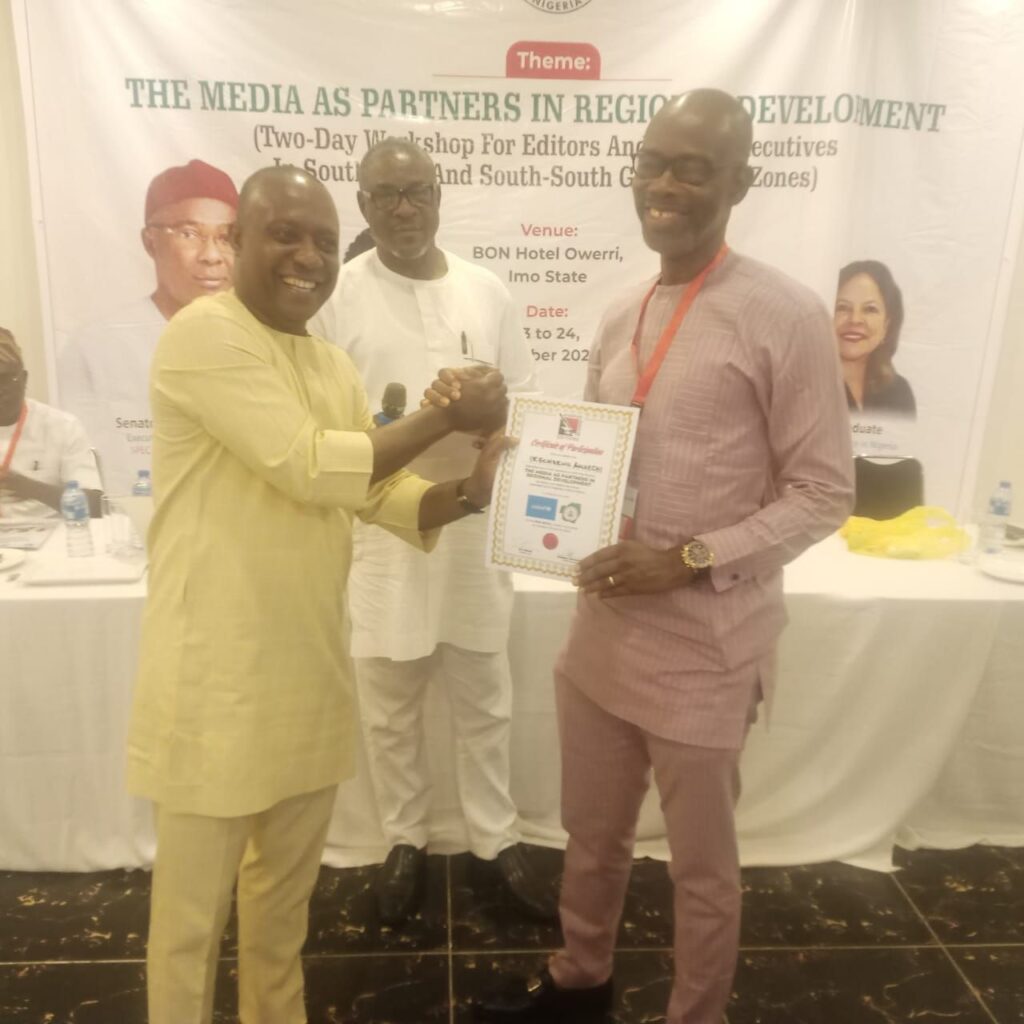By IKECHUKWU AMAECHI

The letter of introduction says the idea of this workshop is to strengthen the media’s role in driving regional development. So, we are looking at the media as partners in regional development, an issue Prof Ben Nwaguma handled brilliantly yesterday. Prof Stella Okunna has today amplified those submissions.
So, if we are looking at the concept, evolution and principles of development journalism, the question will be: What is development and what is journalism?
What is Journalism?
According to the Encyclopaedia Britannica, journalism is “… the collection, preparation, and distribution of news and related commentary and feature materials through such media as pamphlets, newsletters, newspapers, magazines, radio, motion pictures, television, books, blogs, webcasts, podcasts, and e-mail.” Journalism is the production and distribution of reports on the interaction of events, facts, ideas, and people that are the “news of the day.” It is the practice of gathering, recording, verifying, and reporting on information of public importance. Journalism is primarily based on storytelling which may be in various forms like breaking news, investigative reports, feature stories, editorials, reviews, and blogs, serving various roles; the foremost being to inform the public. Journalism is continually evolving to meet the needs of its audience.
Although these general duties have been historically consistent, the particulars of the journalistic process have evolved as the ways information is collected, disseminated, and consumed have changed. There was a time when it started and ended with “newspaper.”
If we take the US, for instance, journalism’s history began in 1690 with the very first American newspaper, Publick Occurrences, which plan was to publish monthly, but outrage by the government forced to close down after its first 3-page issue. Over the course of the next hundred years, two major developments became the catalyst for journalism in the US: the construction of the first printing press in America and the passage of the First Amendment, which granted Americans freedom of speech and of the press. The 1900’s also gave rise to radio, which increased in popularity during the first half of the 20th century due to its mix of news, music, and entertainment programs. The latter half of the 1900s saw television and then the Internet surpass other media as the main source of news for the American public. While newspapers, radio, and magazines are still around, they have certainly declined in popularity with the rapid growth of free and more readily accessible media. Today, news can be shared through newspapers, magazines, radio, television, film, photography and online.
Citizen Journalism
With all the technology that exists today, it’s easy for any person (whether trained or not in the art of journalism) to post a tweet to twitter, a comment on Facebook, or write a blog that disseminates the “news”; the problem is that the story may not be factual, or adhere to an ethical code, but it can still be considered news. Trained journalists are not citizen journalists, but it’s important to note how far technology has come that any person can get their point published in some form.
What is development?
Development is defined as a process that results in growth, progress, positive change, or the addition of physical, economic, environmental, social, and demographic components to an existing system or environment. It is a measure of how advanced a country is socially, economically, or technologically. Economic indicators measure a country’s wealth and how it is generated while social indicators measure health, education and equality. Simply put, economic and social development is the process by which the economic well-being and quality of life of a nation, region, local community, or an individual are improved according to targeted goals and objectives.
It is the responsibility of government to drive this process of development. Section 14(2) (b) of the 1999 Constitution (as amended) declares that the security and welfare of the people shall be the primary purpose of government. In the same breadth, Chapter 2. Section 22 of the same Constitution says the press, radio, television and other agencies of the mass media shall at all times be free to uphold the responsibility and accountability of the Government to the people.
What is development journalism?
The defining objective of development journalism is to participate in the social, economic and cultural upliftment of the society by reporting and analysing policies, events and trends that have a bearing on the society’s development. Development journalism aims to improve conditions in developing countries by investigating and reporting on issues like poverty, healthcare, education, and sustainability. Development journalism primarily focuses on national development especially in the third world countries. It aims to improve conditions in developing countries by investigating and reporting on issues like poverty, healthcare, education, and sustainability. Development journalism is all about uncovering overlooked stories and empower citizens by bringing attention to important issues and proposing solutions. By adhering to the principles of truth, accuracy, objectivity, and fairness, and employing techniques such as research-based reporting, use of visuals, and a people-centric approach, journalists can produce stories that not only inform but also drive social change.
Development journalism: Evolution and expansion
Mass communication scholars have used the concept of development journalism since the 1960s and it simply refers as earlier stated to the initiative led by the mass media to create positive change in many of the aspects of the life of a people. Broadly speaking, the idea is that journalism should play a great role in the country such as dissemination of government policies in order to create awareness among the public as well as mobilize them towards the implementation of these policies. It is “the kind of journalism which pays sustained attention to the coverage of ideas, policies, programs, activities, and events dealing with the improvement of the life of a people”.
The concept first emerged in Southeast Asia particularly in the Philippines in the late 1960s. Some have also argued that it has its roots in revolutionary journalism, promoted by Ghana’s first president, Dr. Kwame Nkrumah, where he used the various media to mobilize the people against the colonizers.
In all, development journalism answers the critical call of the role of the media in shaping society. With advancement in technology, the media landscape in Nigeria has changed significantly. Print consumption is in what looks like permanent decline, with online consumption holding sway. While the mode of consumption of news has changed, the role of the media to inform has not changed.
Essentially, development journalism stems from the development theory of media, which holds that the media should be an agent of educating the masses in line with the development needs of a nation. It says that development communication is that which is employed for the purpose of social transformation.
I also must admit that in some sense, development journalism is a bit of a controversial term because its critics call it “government-say-so” journalism. But it need not be so because broadly speaking, it is a concept that means journalism in developing countries should contribute to social transformation by educating and informing citizens on activities that contribute to economic and social development, highlighting the importance of those issues and activities. In this understanding, there is a conscious bias by the media towards what is seen as a larger goal of the society, and less emphasis on other issues that may be newsworthy but are seen as “trivial” or just not advancing the desired consciousness that development journalism seeks to create.
As earlier noted, we had a lot of development journalism when the economy was very strong in many countries including Nigeria, in the 60s and 70s. In some countries with socialist governments, there simply was nothing else. As from the 1980s with economic liberalization, development journalism began to die a natural death as the media sought to survive in increasingly capitalist economies by being relevant to its consumers by giving more attention to new trends.
Investigative journalism and social transformation
Development journalism entails holding the feet of those in government to the fire. In doing that there is bound to be a clash. Nigeria is in a very bad place today. Governments both at the national and sub-national levels have become more dictatorial and wasteful and don’t want to be held to account. Yet, it is the responsibility of the media to do so on behalf of the people. And this can and should be done even without necessarily being adversarial and antagonistic.
One of the major ways by which the media can effectively play the role of a catalyst in social transformation is through investigative journalism. By uncovering evidence of malfeasance and shedding light on social ills, journalists can influence public discourse in a major way. There is so much that is wrong with our country today, especially our two regions – South east and South-South – and a vibrant tradition of investigative reporting can help change this. Speaking truth to power and going beyond press releases is never easy, but that is what must be done in order to truly make an impact.
But I am also aware that good investigative journalism is about resources, and the ability for editors and publishers to resist external pressure when reporters ask uncomfortable questions. There is a general absence of both, and that is a key reason why there are so many important stories which remain untold.
The ownership structure of the Nigerian press has always revolved around politicians, or those who aim to go into politics. Even back to pre-independence days, Herbert Macaulay, Nnamdi Azikiwe, Obafemi Awolowo and other leading political agitators all owned media outlets. Sadly, Nigeria’s press cannot play an effective developmental role because the elite who own these media outlets most times are only concerned about access to political power – political and economic – and these outlets are deployed in pursuit and maintenance of this access.
And when media organisations run almost exclusively on advertising money from some connected people in society, that revenue is at risk if they or their friends are the subjects of an investigative report. Often, the choice is between the advertising revenue and the report. Therefore, business models that do not rely on the patronage networks of a corrupt political and business class are best for publications that want to do good work in this area.



